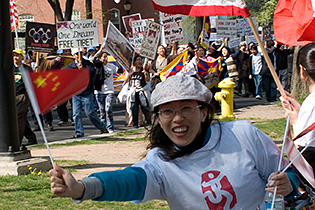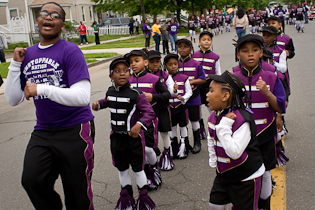 Freddie Fixer will be asked to pay for police overtime. What about the Falun Gong?
Freddie Fixer will be asked to pay for police overtime. What about the Falun Gong?
The question came up Monday night, as aldermen got a first look at a city proposal that aims to cut down on police overtime costs. The proposal cracks down on clubs as well as public events like parades.
The proposal raises the question: What’s a celebration? What’s a free speech event?
And how do Indian weddings fit in?
Since the summer of 2008, the city has asked road races and parades, including the St. Patrick’s Day and Puerto Rican parades, to pay for city cops when they close down streets for their events. The new policy aimed to shift a financial burden — sometimes as much as $25,000 for one event — off the city’s back, and sent parade organizers scurrying to raise money to keep their traditions alive.
City Chief Administrative Officer Rob Smuts introduced a bill Monday that would put that policy into law. The bill aims to clarify when the city will pay for police, and when it will bill the event organizers. Click here to read his proposal; click here to read his accompanying letter.
The law would allow the city to recover costs of police and traffic control for “entertainment-related” events like parades or road races — as well as clubs that hold promoted events that draw big crowds. Events protected by the First Amendment, such as political protests, would be exempt.
The proposal comes in the wake of objections from the American Civil Liberties Union, which raised eyebrows when the city announced this spring it would bill the Freddie Fixer Parade for police overtime costs. Organizers sought to restart the annual African-American pride event in the Dixwell neighborhood this year after it was canceled amid fears of gang violence and lack of money.
This year, the city estimated the police overtime cost would be $30,000 — a staggering amount for the grassroots group. When organizers heard how much it would cost, they didn’t know if Freddie Fixer would go forward.
The ACLU launched an investigation into the city’s new policy. The group expressed concern that free speech rights could be trampled if groups can’t afford to pay for security for their parades.
 It turned out that the parade was not thwarted. The city met with the Freddie Fixer folks and agreed to a shortened parade route. The parade was reborn without a hitch, save for a group of out-of-town ATV riders who got busted before they could join the fun. (The parade is pictured.)
It turned out that the parade was not thwarted. The city met with the Freddie Fixer folks and agreed to a shortened parade route. The parade was reborn without a hitch, save for a group of out-of-town ATV riders who got busted before they could join the fun. (The parade is pictured.)
The city did send the Freddie Fixer group a bill after the event. (The bill’s exact amount was not available.) Freddie Fixer tried to raise the money to pay it — but could only come up with $25, Smuts said.
The group held a fundraiser, but actually lost money in the fundraiser, Smuts said. The organizers won’t be penalized, he said, because they showed a genuine effort to raise the money.
The St. Patrick’s Day Parade Committee raised over $25,000 to pay for its 2009 police bill, and is raising money to prepare for the 2010 event, said Walter Nester, the event’s chairman.
Relief Offered
The city’s draft regulations mirror the way it handled those cases. The city would meet with event organizers to determine how long the streets would be closed and estimate the cost of police presence. The group would discuss shortening the route to minimize costs. The organizers would be asked to pay a portion of that cost, Smuts said.
Groups that can’t pay won’t be punished, Smuts said: “We’re not going to be the cause of them not going on.”
The new bill lays down the rules for groups that can’t afford to pay. Groups will be sent the bill for police overtime. If they can’t pay it, they’d have to sign an affidavit stating inability to pay.
That portion of the bill addresses one of the ACLU’s concerns.
A “Gray Area”?
Another section also addresses the issue of free speech.
The draft legislation basically establishes two types of events. Those that are “entertainment-related” would be billed for overtime costs. Those protected by the First Amendment would not be charged.
In common parlance, the distinction can be put this way: “Celebrations” have to pay, but “protests” don’t, Smuts said.
Downtown Alderwoman Frances “Bitsie” Clark, whose ward is home to the majority of public demonstrations, both cultural and political, raised her eyebrows at that distinction.
She said she hadn’t read it carefully yet — it just arrived on aldermen’s desks, and will be assigned to committee for a public hearing — but wants to hear more about how events would be classified.
She gave an example of what she called a “gray area” of the proposed law.
Last year, Clark was approached by a group of Tibetan Buddhists and members of the Falun Gong. They sought permission to hold a demonstration on downtown streets. That year, a torch passed around the globe in preparation of China holding the Olympics. The group asked Clark for permission to march with a Human Rights Torch, or Freedom Torch, to highlight human rights abuses in China. The group wanted to do a lap downtown, starting from the upper New Haven Green.
Meanwhile, some students from China caught wind of the human rights group’s plans. They asked to hold a counter-protest on the lower Green. Clark gave permission to both groups, who ended up holding a day of dual demonstrations (pictured at the top of this page) in the city’s central meeting place. Over a barrier of cops, the groups chanted to promote their sides of the issue, without incident, she said. “It went beautifully. It was a real opportunity for the freedom of speech.”
The Freedom Torch group did a peaceful lap up Chapel, York, Elm and Temple, to the rhythm of drums, Clark said. She called the event hard to classify. Was their demonstration a “celebration” of freedom? Or a “protest” of China?
“You’re getting into a gray area for that,” Clark said.
She threw out a couple more examples from her experiences downtown. What if the Knights of Columbus marches across town to honor the institution’s history?
Indian families have also closed down a portion of Temple Street to hold weddings at the Omni Hotel, Clark said. The weddings feature a 20-minute outdoor portion, where the groom rides in on a white horse and others dance in the street. Is that protected by freedom of speech?
Smuts didn’t have much trouble classifying the events. The wedding and the K of C event would be “celebrations,” he said, and the Human Rights Torch march would be a “protest.”
“If it sounds like it’s a political statement, that would probably be exempt,” Smuts said. The CAO office would make the final call, but it would base its decision on how the event organizers classify the event, he said.
“If someone insists that it’s a freedom of speech thing, we’re not going to fight too hard on that,” Smuts said.
Clubs Targeted, Too
The bill seeks to expand beyond the city’s current policy into a new realm — crowds at clubs. The law would allow the city to recoup costs not just for parades and road races, but events at clubs. Most clubs dutifully hire extra-duty cops to staff their clubs when they hold a promoted event, like an appearance by a popular DJ or musician.
But some don’t, Smuts said. Those clubs could be billed for the police overtime it takes to tame massive crowds that spill out from promoted events, Smuts said.
The bill “clarifies the chief’s authority” to hire extra-duty cops and bill clubs for the cost, Smuts said. The city would focus on “promoted events,” not the throngs of people who fill Crown Street after last call, he said.






Good idea, Rob Smuts! It's about time we handled parades as a business/celebration, and not as a party where no one is responsible financially. As much as I love a good parade, and understand that many will be upset by this idea, we must remember that we cannot afford to pay our city police salaries as is. Carrying extra debt, incurring massive overtime figures, and pulling police away from regular duty to manage parade traffic is not what we need in New Haven. Way to go!